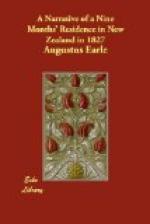CHAPTER LI.
Maori social customs
European liaisons with Maoris
Maori marriages
CHAPTER LII.
A MAORI TANGI
CHAPTER LIII.
Maori characteristics
origin of outrages
family affection
CHAPTER LIV.
TRADE OF HOKIANGA
CHAPTER LV.
A CREW MASSACRED
CHAPTER LVI.
Farewell to new Zealand
Maoris in Sydney
APPENDIX I.
Massacre of Furneaux’s boat’s
crew
cannibalism
APPENDIX II.
A TRIBAL FIGHT
LIST OF ILLUSTRATIONS.
A Maori War Speech (Frontispiece)
Patuone, a Hokianga Chief
Mission Station, Kerikeri
Scene of Boyd Massacre
Maori War Expedition
Maori Method of Tattooing
Specimens of Tattooing
Whalers at Bay of Islands
CHAPTER I.
VOYAGE FROM SYDNEY.
Having made up my mind to visit the island of New Zealand, and having persuaded my friend Mr. Shand to accompany me, we made an arrangement for the passage with Captain Kent, of the brig Governor Macquarie, and, bidding adieu to our friends at Sydney, in a few hours (on October 20th, 1827) we were wafted into the great Pacific Ocean.
There were several other passengers on board, who were proceeding to New Zealand to form a Wesleyan missionary establishment at Hokianga. Amongst these were a Mr. and Mrs. Hobbs, who were most enthusiastic in the cause. They had formerly belonged to the same mission at Whangaroa, when a war which took place amongst the natives totally destroyed their establishment; and, after enduring great varieties of suffering, they escaped, but lost everything they possessed, except the clothes they had on. We had a very fine wind for nine days, and on the 29th we saw a gannet, a sure sign we were within a hundred miles of land, for these birds are never seen at a greater distance from it. True to our anticipations, towards the afternoon the water became discoloured, and at midnight we saw the land.
This interesting island, of which we now got sight, was first discovered by that eminent and enterprising Dutch navigator, Tasman, subsequently to the discovery of Van Diemen’s Land. His voyage from Batavia in 1642, undertaken by order of the then Governor-General of Dutch India, Anthony Van Diemen, was one of the most important and successful ever undertaken, for it was during this voyage that New Holland was discovered, of which Van Diemen’s Land was then supposed to form a part, the extensive island of New Zealand being supposed to form another portion.[1]




